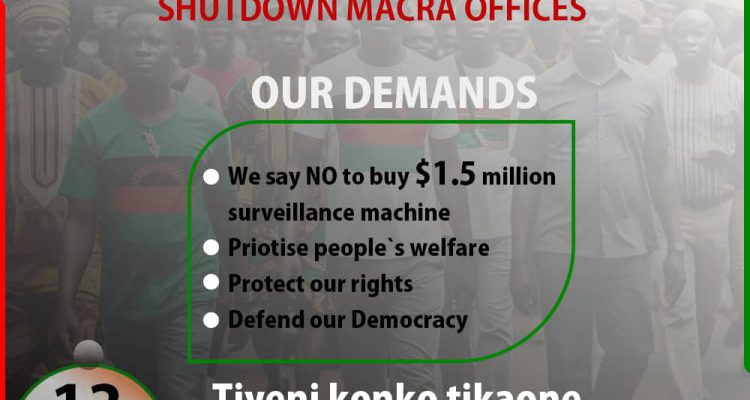
A coalition of concerned citizens across Malawi is preparing to take part in a nationwide series of demonstrations and vigils on February 13, 2025, targeting the Malawi Communications Regulatory Authority (MACRA).
The protests come as a direct response to MACRA’s controversial decision to purchase a $1.5 million surveillance machine, a move that has sparked outrage among activists, civil society groups, and a growing segment of the Malawian public.
The primary catalyst for the planned protests is the belief that the surveillance system poses a direct threat to the country’s democratic foundations, individual privacy, and civil rights.
Protest leaders have expressed concerns that the machine could be used for mass surveillance, particularly monitoring private communications, which would infringe on the freedoms of Malawians and potentially silence dissenting voices.
The protesters’ slogan, “Tiyeni konko tikaone matchiniwo”—translated as “Let’s go and see the machine ourselves”—has gained traction as a rallying cry, encouraging citizens to demand transparency regarding the project.
The demonstrators have outlined four major demands: halting the purchase of the surveillance machine, prioritizing the welfare of the Malawian people, protecting civil liberties, and preserving democratic values. They argue that this machine, rather than serving the security interests of the nation, could be misused for political reasons, including tracking journalists, opposition leaders, and critics of the government.
In a broader context, the protests also reflect growing discontent with the government’s spending priorities. While Malawi grapples with widespread poverty, unemployment, and a strained public healthcare system, critics argue that investing $1.5 million in surveillance equipment is both impractical and irresponsible.
The protestors contend that such funds should be directed towards addressing the country’s immediate socio-economic challenges—specifically healthcare, education, food security, and job creation.
One protest leader commented, “At a time when basic needs are beyond the reach of many Malawians, why should we be spending millions on a machine that only undermines our freedoms? The government must focus on the welfare of its citizens, not on expanding its ability to surveil them.”
The protests are being framed not only as opposition to a specific surveillance project but as part of a larger fight to defend democracy and uphold the constitutional rights of Malawians. These rights, which include freedom of speech and privacy, are seen as being under threat from the government’s increasing surveillance capacity.
Civil society groups, human rights organizations, and opposition parties have expressed solidarity with the protestors, demanding full transparency regarding the purchase and intended use of the surveillance machine.
With the call to action “Osaopa” (Don’t be afraid), the protest organizers are urging Malawians to come out in large numbers to demand accountability from both MACRA and the government.
The demonstrations are framed as a collective stand for the people’s right to know how public funds are being spent and a commitment to resisting any efforts to erode democratic freedoms.
As February 13 approaches, the authorities are under increasing pressure to address the public’s concerns. The protests are expected to be some of the largest in recent years, signalling a moment of reckoning for the government in terms of its handling of public dissent, transparency, and respect for fundamental rights.
The outcome of this movement may shape the political landscape in Malawi in the months and years to come, as citizens demand more from their government in terms of both governance and accountability.














